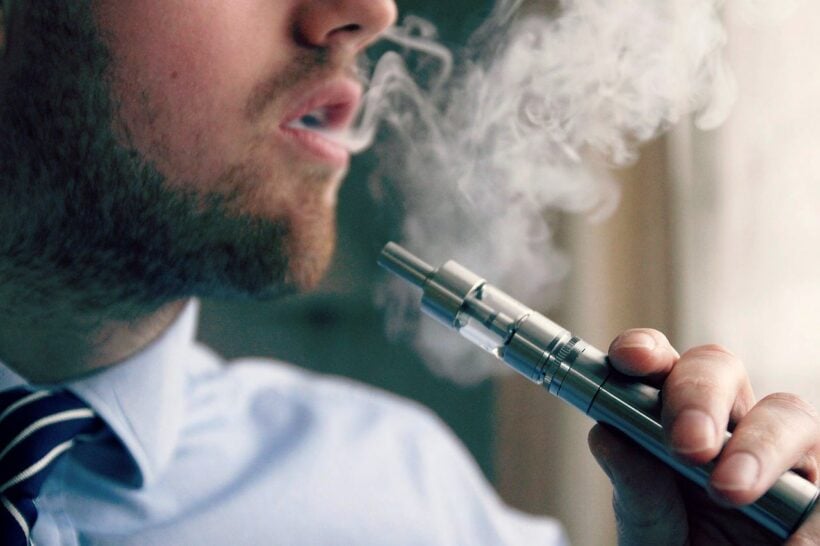Experts argue that vaping should remain illegal

Several experts argued that vaping devices and e-cigarettes should remain illegal in Thailand. At a forum in Bangkok on Monday they say the devices are very harmful to people’s health and should remain prohibited items.
The Director of the Office of Consumer Protection Board’s (OCPB) Legal Execution Division reminded that Thailand currently bans the import, sale, and use of any vaping devices, hookahs, and electronic hookahs.
Penalties for breaking these rules can be harsh. Importing can result in up to 10 years in prison and a fine five times the value of the product. Those who sell the illegal products face up to three years in prison and a 60,000 baht fine. Smuggling vapes and e-cigarettes can land a person in prison for up to 10 years and up to 500,000 baht in fines.
Even mere possession of e-cigarettes or vape pens comes with a penalty of up to five years in prison and a fine four times the value of the product a user is caught with.
Recently authorities have arrested sellers of these items 13 times at Bangkok’s Khlong Thom Market. They are now moving up the chain with their sites set on large importers and sellers of vaping devices and hookahs. There are 10 large importers in circulation, each with over 1 billion baht in distribution businesses.
“Once police arrest vaping device smugglers, they will ask the Anti-Money Laundering Office to find out if anybody influential is involved,” he said.
The president of the Action on Smoking and Health Foundation expressed concern that vaping devices have nicotine, toxic chemicals, and ultrafine particles that can harm the respiratory system.
And it’s addictive due to the nicotine, with 70% of users having trouble quitting vaping. It will take 30 years of data before scientists can confirm any claims that vaping is better than traditional cigarettes.
The nicotine hit provided by some vaping devices is equivalent to smoking 50 cigarettes simultaneously. Yet many people use vaping as a way to “cut down” on cigarette smoking, thinking it’s healthier.
Plus the 16,000 different varieties and flavours are attracting young people unaware of the dangers. The World Health Organisation has long warned that vaping devices encourage children to smoke.
These dangers are becoming more apparent to many governments. In 2014, just 13 countries banned vapes and vaping. But in 2021, that number was up to 32 countries.
The prevalence of vaping addiction among Thai children aged 13 to 15 has increased from 3.3% in 2015 to 8.1% in 2021. Additionally, the data indicates that in 2021, around 33% of the Thai population was found to be addicted to vaping.
The Digital Economy and Society Ministry has shut down 7,000 websites related to vaping devices. The OCPB has joined the police to ensure that people, especially children, do not have access to online advertising related to vaping devices. Advertisers can also be penalized, with authorities considering promoting vaping products as aiding and abetting.
Latest Thailand News
Follow The Thaiger on Google News:


























